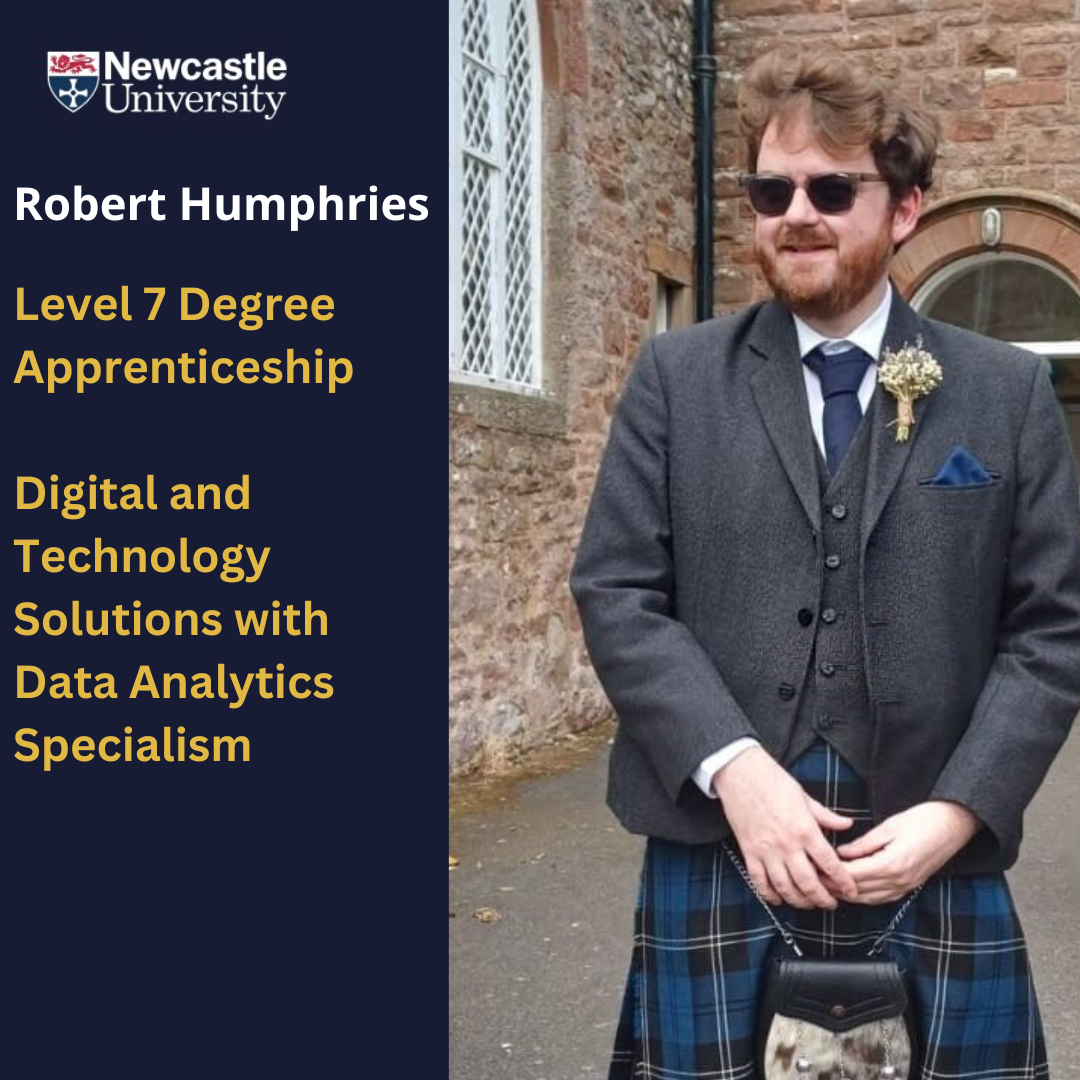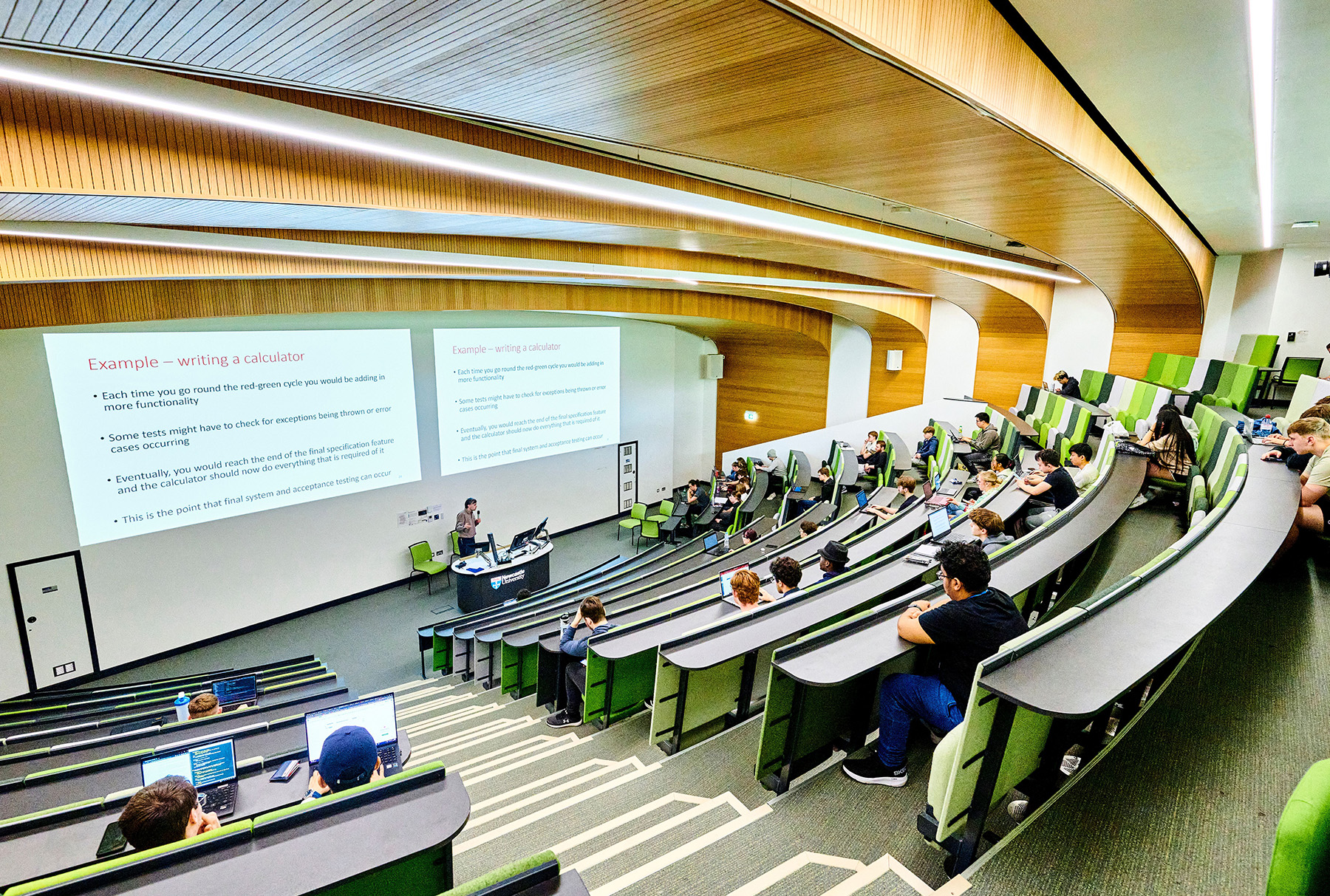National Apprenticeship Week 2025: An Interview with Robert Humphries
National Apprenticeship Week shines a light on the positive impact apprenticeships make to individuals, businesses and the wider economy. To mark the occasion, we interviewed Robert Humphries, current student on our Level 7 Digital and Technology Solutions degree apprenticeship.
12 February 2025
As well as more traditional undergraduate and postgraduate degrees, the School of Computing offers a Level 7 Degree Apprenticeship in Digital and Technology Solutions, with a specialism in Data Analytics. The course is designed for employees working in Data Analytics and IT and allows students to earn an Master’s qualification while working full time.
Robert Humphries is in his first year of our two-year Level 7 apprenticeship and works as an Information Analyst for the NHS Newcastle upon Tyne Hospitals Trust. After studying for a BSc degree in Chemistry at Northumbria University, Robert developed an interest in IT and taught himself basic skills in Microsoft Power BI and SQL.
To mark this year’s National Apprenticeship Week, we interviewed Robert about how his apprenticeship is helping to develop his career in Data Management.
For more information about the apprenticeship offered by the School of Computing, please email computing.teaching@newcastle.ac.uk

Why did you decide to do an apprenticeship?
As I don’t have a background in Computer Science, I wanted to gain a formal qualification that would allow me to progress in my career. I have a busy role at work, so there is rarely time to learn new skills that could benefit the organisation and improve how we do things.
I decided to go with the apprenticeship option as I liked that I would be able to integrate what I learnt on the course into my current role.
What have been some highlights of the course so far?
I have enjoyed seeing the link between the theories I am learning on the degree and how they are applicable to my working life. I’ve been able to suggest improvements to the systems and processes we do at work because I now have a greater understanding of the software., That’s enabled me to streamline my regular tasks, so I have time to do other work.
In the opening modules of the course, we’ve covered using Power BI, R & Python. Personally, I would say R has been the most useful so far as it allows me to analyse larger datasets that were unmanageable in programmes like Excel. It's also allowed me to automate some of the older reporting I used to do. For example, I can now write an R script to load data, transform the data into what is relevant for reporting, create plots and then export it to PDF format in one step, rather than manually doing each individually.
The hope is to implement Python in a similar way going forward.
Prior to working in my current role, I had taught myself how to use Power BI Dashboard. This is now a large part of my responsibilities at work, and so I found the Data Visualisation module particularly interesting and useful (specifically looking at the positives and negatives of certain visuals and when to use them). I also found looking more into user interaction and story telling with data particularly informative, as I can now create dashboards and reports that are more useful for the user. I’ve also enjoyed learning more about Data Management and Exploratory Analysis, especially in relation to R programming.
What do you believe are the key benefits of the apprenticeship to your employer?
I think the key benefit is that the degree is giving me ideas of what we could do differently. One of my regular tasks at work is creating dashboards in Power BI to make the data easier to visualise. This is especially important in the NHS where the dashboards are used to see the data trends across areas such as staffing, patients, and the effectiveness of the clinics the Trust runs.
As part of my role, I have regular monthly reporting tasks which are often time-consuming as they involve manually transforming large amounts of data (removing irrelevant columns/rows and calculating new columns etc.) before printing the new report in formats suitable for the end user (i.e. PDF).
Now I have implemented an R Script, which goes through these relevant steps upon running the report and has greatly reduced the time it takes to produce the report. This has also removed the potential user error that can happen when manually transforming data.
By improving the processes in the Analysis team (part of the Information Services department), my colleagues are also able to make decisions that increase efficiency of the wider service.
What advice would you have for someone who is thinking about doing a Degree Apprenticeship?
I think it’s important to consider whether you can handle the extra work that comes from studying for a Master’s qualification while working full time. We have weekly lectures that are a mixture of online and in person, as well as lots of extra self-study and reading to make sure we understand the theories. However, I do think the benefits outweigh the two years of balancing work and study. Being employed full time means I’m still earning a full-time wage and don’t have to consider tuition fees, as my employer has access to government funds. Overall, I think doing this Master’s will help me in my career, both in my current role and with my future job prospects.
Being employed while studying for my Master's qualification means I'm still earning a full time wage and don't have to consider tuition fees, as my employer has access to government funds.
